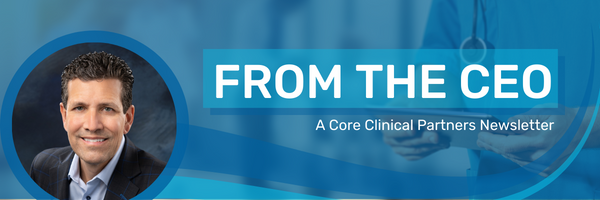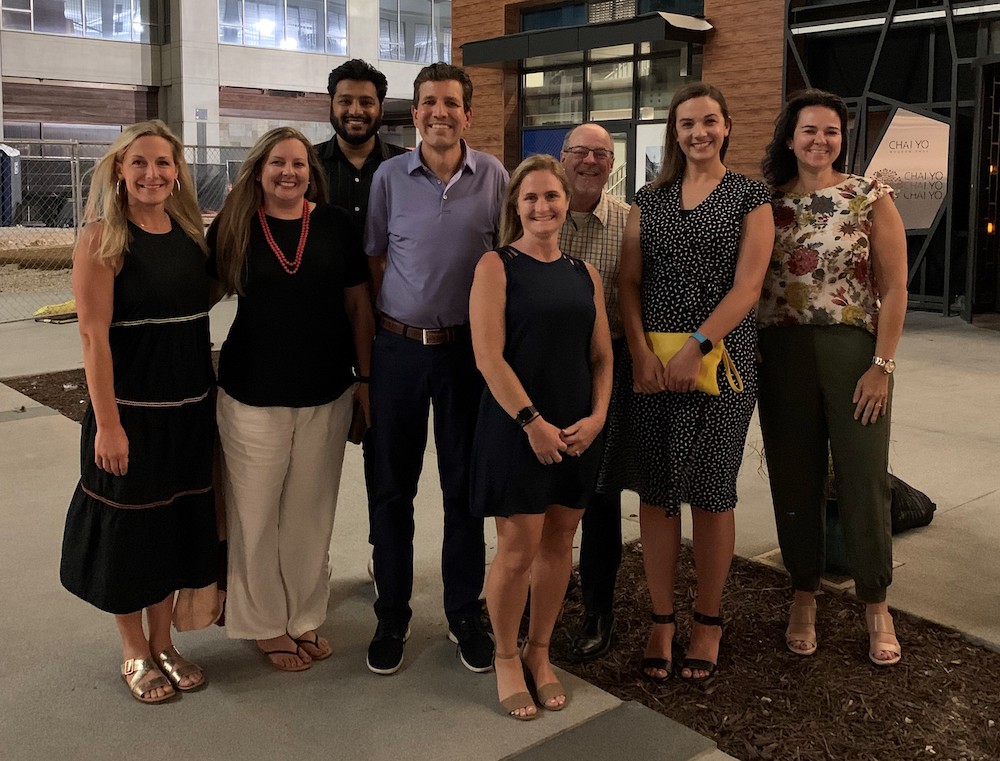Core is a place where big experience can thrive in a nimble environment
Greetings and welcome to Issue #3. I’m excited about this one, because this month I get to highlight my leadership team. I’ll talk about why I hired them and what my thinking is about building a team, and I’ll also give my answer to a really tough question, not just for physician services, but for all businesses: how do you maintain the strengths of a small, nimble company even as you grow into a larger organization?
This month, many of my team traveled from around the country to meet together in Atlanta for a group strategy session and retreat. They came from all over. Jessica Long came from Raleigh, NC. Mark Canada is from St. Louis. Wins Mathew is from Oklahoma City, and Kelsey Wood is from Austin, TX.
Here’s a photo of all of us from the retreat:
So, why is my team scattered throughout the country, and why did I hire them in the first place? Read on!
My thesis: big company capability, small company service
One thing I’ve seen in my years in physician services is that the big, national groups have enormous tools at their disposal—bells and whistles, if you will—but they often struggle to move the needle on quality. These groups have all the technology and data and resources they could want, plus an extraordinary amount of experience in seeing what works and what doesn’t. But for all their experience and resources, their size makes it difficult to maintain a focus on service, and it’s often because the docs working for them feel they are working for a big and distant corporate office. As I wrote about in my first newsletter, what they are missing is that all important quality of alignment and buy-in at the local level.
Meanwhile, small groups usually have much better buy-in and alignment. But, while they may be great at patient care, they don’t have the bells and whistles. A small group can have fantastic doctors working for them, but these doctors still have only seen emergency medicine practiced in one place, or hospitalist medicine as it’s practiced inside one hospital.
My idea when I started Core Clinical Partners was to try and do both. To get the capabilities of a big group and combine it with the service and local buy-in of a smaller group.
1. Same people, different environment
This past month, Mark Canada, our Vice President of Clinical Operations, has been spending a ton of time helping one of our partners in Louisiana work through nurse staffing and operational issues. Mark is a nurse himself and before coming to Core he was a VP of Clinical Operations for Envision, where he led a team of five directors and won numerous awards for quality improvement programs (Mark did a great Q&A about his experience you can read here).
The point is, Mark has seen and done it all. My goal as a leader is to find people like him, with that breadth of experience, and say: we’re not going to have you in charge of 30 contracts, instead we’re going to have you in charge of four or five. And you’re going to be able to give better service to our hospital partners than you could in the larger companies.
In April, Mark was “boots on the ground” at our partner INTEGRIS Baptist in Oklahoma for nine straight days helping them implement a geographic rounding model, bringing all his depth and breadth of experience with him. Spending that much time on the ground with a hospital partner is almost unheard of in our business. But it’s exactly the kind of work I had in mind when I started Core.
2. My philosophy of building a leadership team
Obviously, the first thing I look for when I’m hiring is whether I will enjoy working with the person. If I like working with them, that’s a good indication our hospital partners will also enjoy working with them.
Beyond that, I’m looking for two things: first, experience within physician services or hospital administration, and second, the ability to embrace a nimble, smaller company mindset.
The first quality was important to me because I wanted my team to really understand what our hospital partners face within their organizations. Jessica Long, our Senior Vice President of Strategy, was herself a hospital CEO. Wins Mathew, our Vice President of Operations, worked for ten years in a diverse set of roles at INTEGRIS. Wins has worked in hospitals since he was in college. He did some HR, some recruiting, then went to get his MBA, and we’re glad to have him managing Core’s Oklahoma operations.
My team also has experience having come from large physician services groups: Kelsey Wood, Director of Revenue Cycle, came from HNI Healthcare (Kelsey lives and breathes the weeds of revenue cycle). Gretchen Payne, our CFO, spent seven years at The Schumacher Group. Mark came from Envision. I came from Apollo.
I’m not gonna say we’re like a “Dream Team” of physician services — but now I’ve put the idea into your head, haven’t I?
One thing I’ve tried to do as we’ve grown is give this team all the support and space they need to solve problems for the hospitals and the communities we serve. We can collectively come together, make a decision in a meeting, and go execute. No committees, no intricate sign offs, no silos.
3. Remote work and the pandemic
Right from the start, when I founded Core, I knew I wanted the best people, regardless of where they lived. I didn’t want the best people who happened to live in Atlanta, or the best people who would be willing to relocate to Atlanta — I just wanted the best people.
Besides, I knew our team would have to travel to be with our hospital partners, and our hospital partners would be all over the country. It’s not that I don’t value time in-person with my team. I very much do value that. It’s just that I put greater value on getting the highest quality people.
When the pandemic hit in 2020, it was the rest of the country that really caught up to us. They realized remote work could be done, and done well, and that it really mattered less where people were than we thought it did. Thus, our VP of Clinical Operations is in St. Louis. Our SVP for Strategy is in Raleigh. Our Director of Revenue Cycle is in Austin. Our CFO is in Lafayette, LA.
It’s been this way since my first full-time hire: Kelly Barnett, our Operations Manager. A true jack of all trades, Kelly worked with me at Apollo doing everything from recruiting and scheduling to being my executive assistant. She is exactly the kind of first full-time hire every successful company needs. She lives in Atlanta now, but when I hired her she lived two hours north, and also worked remotely.
Ultimately, it’s about the mission
Why should we always have people available to go improve hospital processes? Because ultimately, solving these problems helps patients. No matter how much we grow, we can’t lose sight of why we do this work in the first place: to take care of patients, to help them heal, to save lives.
No matter what size the company is, I’ve found that a lot of quality flows from staying focused on that mission.



